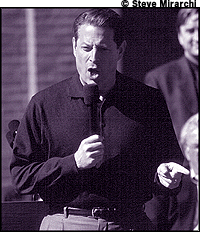September 7 - 14, 2000
![[Features]](/standard/image/headers/talking_politics_header.gif)
McCain lite, continued
by Seth Gitell
Some conservatives say that Gore's embrace of campaign-finance reform is an unusually effective weapon against Bush. "It's fashionable in Washington to deprecate the importance of campaign-finance reform," says the Weekly Standard's William Kristol. "But it reflects for voters a certain commitment to clean up the process. Republicans can snicker about that and talk about the Buddhist temple. [But] I think it helps Gore. He's at least appropriated some of McCain's elements."
And that's not all: Gore has even usurped McCain's theme of patriotism. During his convention acceptance speech, Gore emphasized his service in Vietnam. "I enlisted in the army because I knew if I didn't go, someone else in the small town of Carthage, Tennessee, would go in my place," he said. "I was an Army reporter in Vietnam. When I was there, I didn't do the most, or run the gravest danger. But I was proud to wear my country's uniform." That pride was evident a few weeks later when Gore donned his Veterans of Foreign Wars garrison cap to proclaim "an unshakable national commitment to our veterans" -- another one of the hallmarks of McCain's campaign.
Even Gore's choice of a vice-presidential nominee reflects the McCain influence. On the surface, McCain, the war-hero scion of an all-American military dynasty, and Lieberman, the professorial son of an Orthodox Jewish milkman, don't have much in common. But in the Senate, Lieberman and McCain worked closely in many matters relating to foreign policy and defense. Each is the type of senator to whom the other party can look for support on specific issues. That kind of bipartisanship has become extremely rare on Capitol Hill, but it is welcomed by the American public, particularly swing voters. To be sure, nothing in Lieberman's portfolio can come close to McCain's status as a war hero, but his staunch moral and religious background elevates him above the usual Washington hack. In this way, again, his selection is a nod to what political scientists used to call "the vital center."
"The choice of Lieberman is a choice that transcends the two parties," says the Hudson Institute's Weinstein. "Lieberman is someone who stands there with some form of moral authority. His religion, while not really heroic, shows he stands for something beyond naked political ambition." In other words, beyond Clinton.
One Washington-based Republican insider, requesting anonymity, says that he, too, has noted the similarity between the new Gore and McCain: "The most important aspect of his appeal is the fight against special interests and [for] campaign-finance reform. Gore's tone is much more potentially appealing to the independents. A lot of people in Republican ranks underestimated his ability to capture that message to appeal to the swing voters."
Indeed. "The big surprise is I did not think the Gore people would be smart enough to do this," says Democratic consultant Michael Goldman, "and even if they were smart enough, I did not know if Gore himself would have the guts to do it."
Even as Gore has displayed the wit to take wisely from McCain, Bush's campaign has blundered by arrogantly acting as if it were above learning from the senator -- even though McCain attracted more of the type of voters that a candidate needs to win the general election. "Bush seems to have made no effort at all to appropriate any of McCain," says Kristol. Take foreign policy. When the Kosovo war broke out last year, Kristol notes, McCain gained notoriety for boldly supporting US military involvement and criticizing the Clinton administration for not going far enough. Now Bush's running mate, Dick Cheney, is calling for the recall of troops in the Balkans. "What launched McCain was Kosovo," says Kristol. "Bush and Cheney sound more like congressional Republicans who opposed Kosovo. If you were attracted to McCain because he was for a strong national defense and a muscular America abroad and campaign-finance reform at home, you might not be attracted to Gore, but you wouldn't be won over to Bush by anything Bush is doing."
Not everyone believes that Gore's strategy of borrowing from McCain's message will attract swing voters to his candidacy. Ed Goeas, the Republicans co-architect of the respected "Battleground" poll, which gives a detailed voter analysis of swing areas, contends that Gore has not received a post-convention bounce at all. "I'm seeing that he hasn't gotten a boost," says Goeas, arguing that the other polls have over-counted Democratic and union stalwarts because the polls are conducted on weekends. (Goeas contends that such weekend polls over-count union members as a general rule.) In addition, says Goeas, his polling numbers show Bush leading Gore among white ethnic Catholics, the kind of Reagan-Democrat swing voters who gravitated to McCain. Goeas further notes that the debate over the McCain phenomenon overstates the issue because such a small percentage of the electorate actually voted in the presidential primaries. "It's a trap people always get into saying who these voting groups were during the primaries," he says.
Page | 1 | 2 | 3 | NextSeth Gitell can be reached at sgitell[a]phx.com.
The Talking Politics archive

